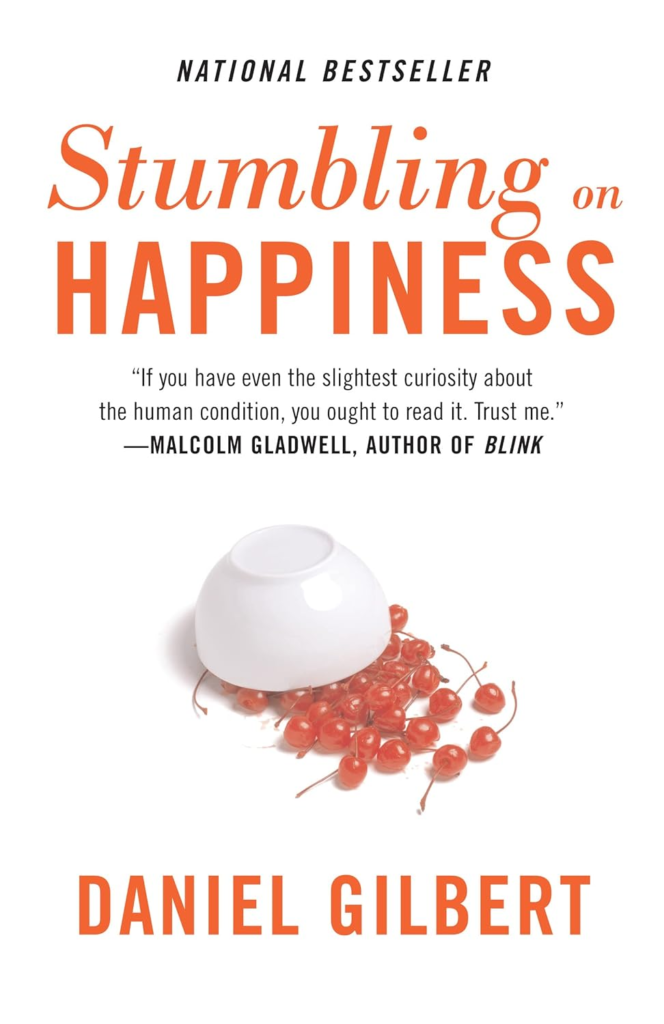Stumbling on Happiness brilliantly dissects our mind‘s inner workings with respect to remembering the past and predicting the future. Daniel convinced me that I experience numerous cognitive illusions – manifestations of thoughts that distort my perception of the past and present. He makes a compelling argument that a significant portion of our emotions and feelings arise due to an incomplete or erroneous view of reality, and this often escapes our awareness. This book has impacted how I develop long term financial products by giving me an enhanced appreciation that the client’s ideal solution goes well beyond financial considerations.
You should read this book if you…
- want to better understand how your memory works and its limitations
- want to understand how you (or your customers) can achieve peace of mind about the future
- seek to better interpret your emotions to make more useful decisions
Additional Information
Year Published: 2006
Book Ranking (from 1-10): 9 – Excellent – Broad and very well articulated insights
Ease of Read (from 1-5): 3 – Average
Key Highlights
- Imagining a pleasant future can be more pleasurable than the future itself and we have a longer period of which to enjoy it
- Imagining unpleasant events is useful to a point, when it’s used not to predict the future as much as to preclude it
- Much of out behaviors is an express of our penchant for control. Gaining control can have a positive impact on one’s health and well-being but losing it can be worse than never having it at all
- We reweave our memories with information acquired after the memory because the act of remembering requires us to fill in details that were not actually stored yet we cannot tell when we’re doing this because it happens quickly and unconsciously
- Our brain is not simply a recording device but rather a smart computer that gathers information and makes judgements to interpret the way things are. Usually the interpretation is so good we don’t realize it’s an interpretation
- When we imagine, we treat what we come up with as an accurate representation of facts, instead of shrewd interpretation filled with holes and uncertainty
- Just as we tend to treat the details of future events that we do imagine as though they were actually going to happen, we have an equally troubling tendency to treat the details of future events that we don’t imagine as though they were not going to happen. In other words, we fail to consider how much imagination fills in, but we also fail to consider how much it leaves out
- The comparisons we make have a profound impact on our feelings, and when we fail to recognize that the comparisons we are making today are not the comparisons we will make tomorrow, we predictably underestimate how differently we will feel in the future
- We might think of them as having a psychological immune system that defends the mind against unhappiness in much the same way that the physical immune system defends the body against illness
- We remember the best and worst of times instead of the most likely of times (which are often ordinary and boring) making us overweight the likelihood of something great or terrible happening
- Research reveals that memory is less like a collection of photographs than it is like a collection of impressionist paintings rendered by an artist who takes considerable license with his subject. The more ambiguous the subject is, the more license the artist takes, and few subjects are more ambiguous than emotional experience. Our memory for emotional episodes is overly influenced by unusual instances, closing moments, and theories about how we must have felt way back then, all of which gravely compromise our ability to learn from our own experience
- If you believe (as I do) that people can generally say how they are feeling at the moment they are asked, then one way to make predictions about our own emotional futures is to find someone who is having the experience we are contemplating and ask them how they feel. Instead of remembering our past experience in order to simulate our future experience, perhaps we should simply ask other people to introspect on their inner states. Perhaps we should give up on remembering and imagining entirely and use other people as surrogates for our future selves
- Because we can feel our own emotions but must infer the emotions of others by watching their faces and listening to their voices, we often have the impression that others don’t experience the same intensity of emotion that we do, which is why we expect others to recognize our feelings even when we can’t recognize theirs

Discover more from The Broader Application
Subscribe to get the latest posts sent to your email.
